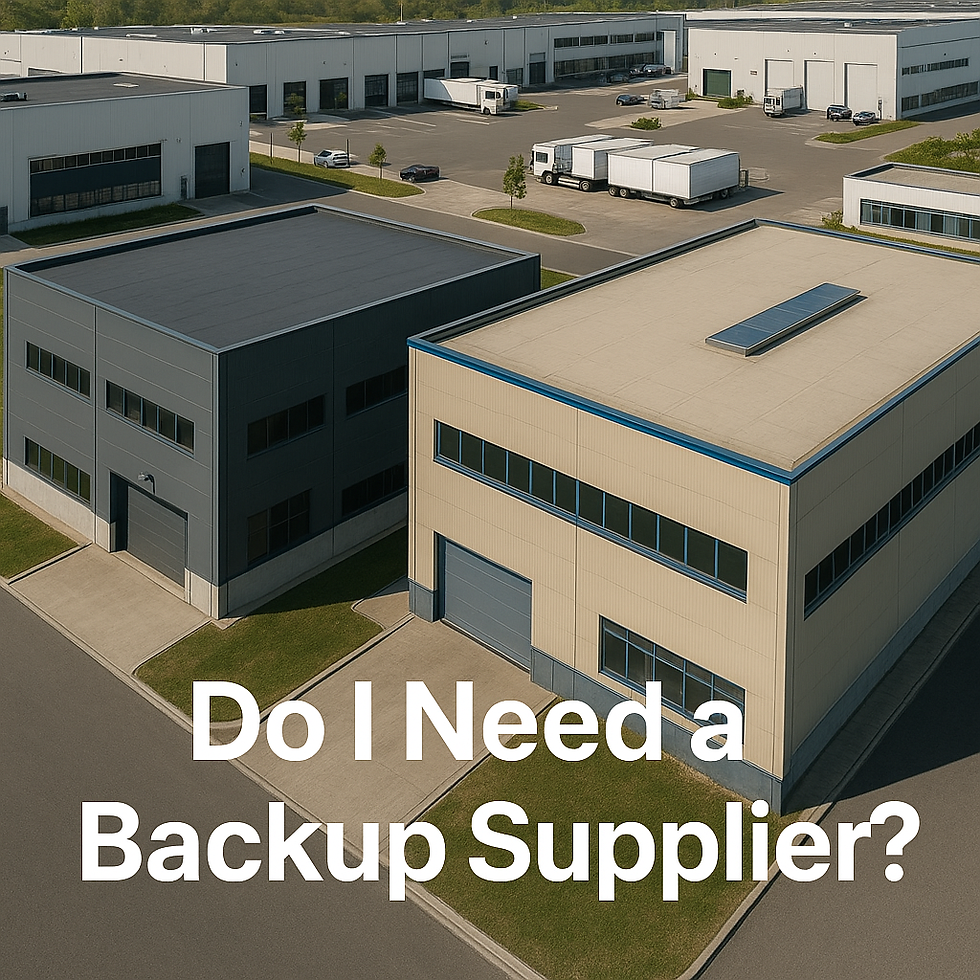What Is a Backup Supplier and Why Do You Need One
- Jared Haw
- Sep 5, 2025
- 3 min read
Updated: Oct 24, 2025

A backup supplier is a qualified secondary manufacturer that a company engages to produce the same components, subassemblies, or finished goods as its primary supplier. A backup supplier is an important part of mitigating risk in your manufacturing strategy. The backup suppliers are vetted, approved, and capable of meeting the same quality standards, timelines, and compliance requirements as the main supplier.
The distinction between a primary and backup supplier is simple: it's just who you purchase from. While the majority of production often flows through the primary supplier, the backup supplier remains positioned to absorb orders in the event of a disruption, whether temporary or long-term. For companies operating in complex global supply chains, having a backup supplier is less about convenience and more about building resilience and ensuring business continuity.
Why You Might Need a Backup Supplier
The most common reason companies establish a backup supplier is risk mitigation. Relying solely on a single supplier introduces significant vulnerability. Any sort of disruption or policy change can halt production and delay market launches. By maintaining a qualified backup supplier, companies ensure continuity even if their primary supplier cannot deliver.
A backup supplier also introduces leverage. When both suppliers are capable of producing the same part or product, companies are in a stronger position to negotiate pricing, lead times, and service levels. This competitive dynamic often drives better performance across the supply base.
Finally, backup suppliers can play a strategic role in scaling. As production volumes increase, distributing demand across multiple partners can reduce bottlenecks, shorten lead times, and improve overall supply chain flexibility. Rather than being an emergency-only resource, a backup supplier can actively support growth while providing long-term stability.
When to Put a Backup Supplier in Place
The right time to qualify a backup supplier depends on the stage of your product and the maturity of your supply chain. For companies in early development, it may not be practical to evaluate and vet two suppliers for each component. However, once a product reaches production scale or becomes central to revenue, the risk of relying on a single source often outweighs the cost of establishing a backup.
A backup supplier becomes particularly critical in three scenarios. First, when volumes are increasing and a single supplier may not be able to meet demand consistently. Second, when your production is tied too closely to one region, it exposes you to geopolitical or tariff-related risks. Third, when you have experienced recurring quality or delivery issues that suggest overreliance on your primary supplier.
By proactively developing a secondary option before problems arise, companies can transition more smoothly during disruptions and avoid the costly delays that come from scrambling to qualify a new supplier under pressure.
Conclusion
A backup supplier is not just a company you can fall back on, but it is a strategic move to build resilience and competitiveness in your supply chain. By qualifying a secondary manufacturer, companies safeguard against disruption, gain leverage in cost and lead-time negotiations, and create the flexibility needed to scale production effectively.
The companies that succeed are those that prepare in advance, ensuring that one unexpected event does not jeopardize product launches, revenue, or customer trust. Establishing a backup supplier is one of the most practical and effective steps you can take to protect your business and secure long-term stability.




Comments